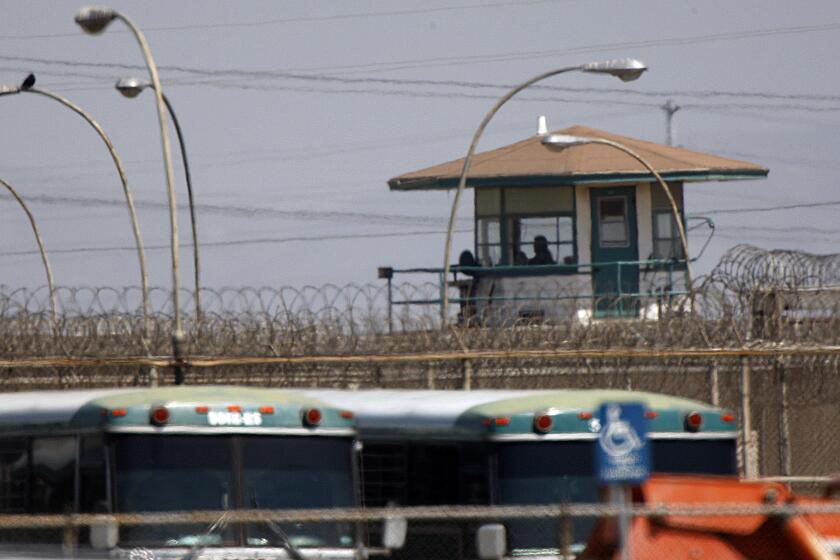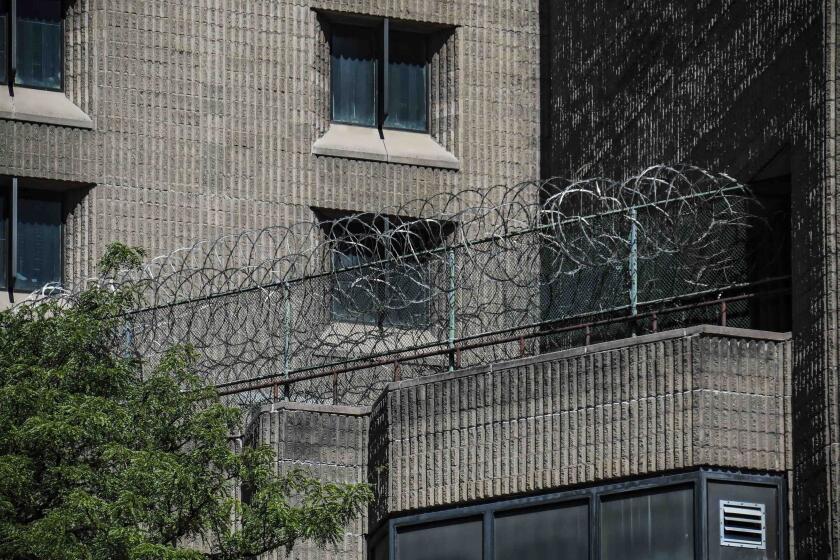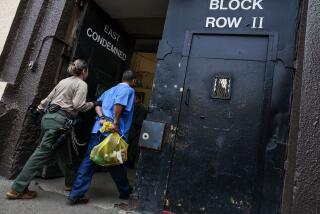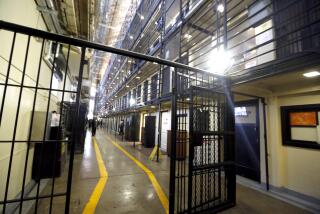700 Chino inmates to be transferred as coronavirus sweeps prison
- Share via
Amid a growing coronavirus outbreak at the California Institution for Men in Chino, nearly 700 vulnerable inmates will be transferred to a dozen other prisons around the state, officials said.
The prisoners who will be moved have all tested negative but have medical histories that could make a COVID-19 infection potentially life-threatening.
Under the plan, agreed to by the California attorney general, the state Department of Corrections and Rehabilitation and the Prison Law Office, 691 inmates will be redistributed across 12 other state prisons, a reversal in corrections policy that forbids transfers.
The moves come amid a massive coronavirus outbreak at the Chino prison that has infected every dormitory used to house inmates. The prison has reported more than 600 cases and nine deaths.
The transfer orders were revealed in a document filed Wednesday in U.S. District Court by California Atty. Gen. Xavier Becerra and the Prison Law Office.
California Correctional Health Care Services, which oversees medical care for prisoners, had previously opposed such transfers, saying that “mass movement of high-risk inmates between institutions without outbreaks is ill-advised and potentially dangerous,” noting the movement “carries significant risk of spreading transmission of the disease between institutions.”
But the court filing said the prior approach of keeping inmates with underlying health issues in an infected facility had failed to keep them safe.
“Since CDCR’s current and past measures have failed to stem outbreaks and stop the spread, it is imperative that vulnerable patients receive additional protection immediately,” the brief stated.
The Corrections Department has instituted daily screenings for all staff before entering state prisons, which are increasingly becoming “powder kegs” in the spread of COVID-19, the illness caused by the coronavirus.
All prison employees are required to wear cloth masks and have been ordered to maintain physical distancing as much as possible. At the Chino and Avenal correctional facilities, all workers also have be required to be tested.
The state also will institute strict cleaning protocols within the prisons, with logs to document the disinfecting of showers, toilets and sinks between use.
According to the court filing, attorneys conducted an online video visit of the men’s prison on May 22. The Prison Law Office noted that while the state had claimed there was at least six feet of social distancing for inmates housed in the dormitories, a live video showed otherwise.
Families of prisoners have conducted drive-by protests outside the prison in recent weeks.
Being in a prison with a coronavirus outbreak is a death sentence, says an inmate with three prior heart attacks.
Inmate John Blagg, who is serving an eight-year sentence at Chino for driving under the influence with injury and has a history of strokes and heart attacks, said inmates have been split up into groups of those who have tested positive and those who have tested negative. Prison authorities have also set up tents in the courtyard areas in an effort to spread the inmates out.
“I don’t deserve a death sentence,” he told The Times last month in an interview. “I am afraid I am not going to make it out. .. I understand I did what I did. I’ll do my time. I don’t want to die, and I don’t want other people to die.”
California’s prisons resumed processing inmates this week for the first time since Gov. Gavin Newsom suspended their intake in March. New inmates will be accepted from only four counties: Los Angeles, San Bernardino, San Diego and Fresno.
“It is anticipated that no more than 200 inmates will be accepted from those counties through June 19,” according to the state corrections department.
Inmates will go to one of two intake centers, at North Kern State Prison or Wasco State Prison. At each location, inmates with be offered coronavirus testing. If they test positive, they’ll be isolated. Any inmate declining testing will be quarantined for 14 days.
Thousands of prisoners have been released as the state has sought to socially distance inmates in an effort to help stem the spread of the coronavirus. The state noted in its filing Wednesday that 3,000 inmates a month are released.
The lack of intake in state prisons for the past two months further reduced the number of prisoners by 6,000, according to statements made in recent federal court hearings. But outbreaks of the virus have gripped prison populations across California and the nation.
Lawmakers are joining prisoners’ advocates who are alarmed by the government’s response to the growing coronavirus crisis behind bars.
At federal prisons in California, 1,800 inmates have been infected at two Lompoc facilities as well as San Pedro’s Terminal Island, and 12 prisoners have died. The ACLU is suing to force the release of some federal inmates, citing health dangers.
In state prisons, an effort by prisoner lawyers to force additional releases has so far failed. A three-judge federal panel and a single federal judge have rejected moves by lawyers seeking more releases for inmates in a long-standing legal fight over overcrowding and medical treatment in California’s prisons.
More to Read
Sign up for Essential California
The most important California stories and recommendations in your inbox every morning.
You may occasionally receive promotional content from the Los Angeles Times.













